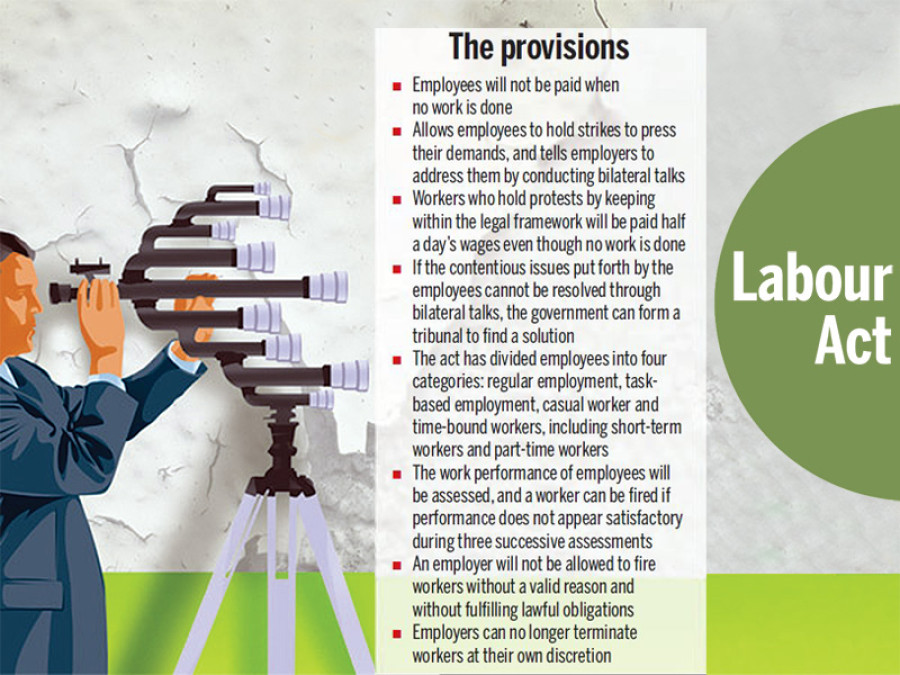Money
Labour Act includes ‘no work, no pay’ principle
The private sector and trade unions on Thursday welcomed the recently endorsed Labour Act that incorporates the principle of ‘no work, no pay’. The provision means that employees will not be paid when no work is done.
The private sector and trade unions on Thursday welcomed the recently endorsed Labour Act that incorporates the principle of ‘no work, no pay’. The provision means that employees will not be paid when no work is done.
Speaking at a programme organised by the Federation of Nepalese Chambers of Commerce and Industry (FNCCI), representatives of the private sector and trade unions said that effective implementation of the provision would yield the desired results in the economic agenda. The private sector has long been demanding ‘no work, no pay’ and ‘hire and fire’ principles be included in labour laws after employees started halting production in the name of protest and then demanding wages for the period when they did not work.
Moreover, difficulties in laying off workers even when businesses were facing severe financial problems had created hurdles for employers. The bill, which was passed by the Legislative-Parliament last week, allows employees to hold strikes and sit-in programmes to press their demands, and tells employers to address them by conducting bilateral talks.
Workers who hold protests by keeping within the legal framework will be paid half a day’s wages even though no work is done. If the contentious issues put forth by the employees cannot be resolved through bilateral talks, the government can form a tribunal to find a solution. The labour tribunal will consist of three justices. The act has divided employees into four categories: regular employment, task-based employment, casual worker and time-bound workers, including short-term workers and part-time workers.
The work performance of employees will be assessed, and a worker can be fired if performance does not appear satisfactory during three successive assessments.
FNCCI President Bhawani Rana said the act could help develop a warm relationship between the employer and employees. “It is expected to contribute to industrial development,” Rana said.
The law also covers basic social protection measures such as gratuity, accident benefit, sickness benefit and provident fund, among others. Workers from the informal sector including domestic workers, trainees and part-time workers are entitled to receive these benefits.
Chandra Dhakal, chairman of the employers’ council of the FNCCI, said the act would help minimize the gap between the employer and employees as it incorporates workers from almost all areas. “In addition, the provision of job performance assessment will held to enhance overall productivity of the economy.”
After the act goes into effect, an employer will not be allowed to fire workers without a valid reason and without fulfilling lawful obligations. In case of unlawful firing, a case can be filed against the employer. Bishnu Rimal, president of the UML-affiliated General Federation of Nepalese Trade Unions (GFONT), said the act was labour-friendly as it secures all fundamental rights of workers. “The provision allows employees to work without fear of being fired from the job. Employers can no longer terminate workers at their own discretion,” Rimal said.
The labour inspection mechanism that the act has provisioned will monitor whether agreements made between employers and employees are being effectively implemented. “The act has left almost no room for disagreement among workers as it has incorporated almost all their issues,” said Khila Nath Dahal, president of the Nepal Trade Union Congress (NTUC). Richard Howard, country director of the International Labour Organisation, Nepal, said that the new act could be a key contributor for job creation in Nepal.
- Allows employees to hold strikes to press their demands, and tells employers to address them by conducting bilateral talks
- Workers who hold protests by keeping within the legal framework will be paid half a day’s wages even though no work is done
- If the contentious issues put forth by the employees cannot be resolved through bilateral talks, the government can form a tribunal to find a solution
- The act has divided employees into four categories: regular employment, task-based employment, casual worker and time-bound workers, including short-term workers and part-time workers
- The work performance of employees will be assessed, and a worker can be fired if performance does not appear satisfactory during three successive assessments
- An employer will not be allowed to fire workers without a valid reason and without fulfilling lawful obligations
- Employers can no longer terminate workers at their own discretion




 9.89°C Kathmandu
9.89°C Kathmandu














